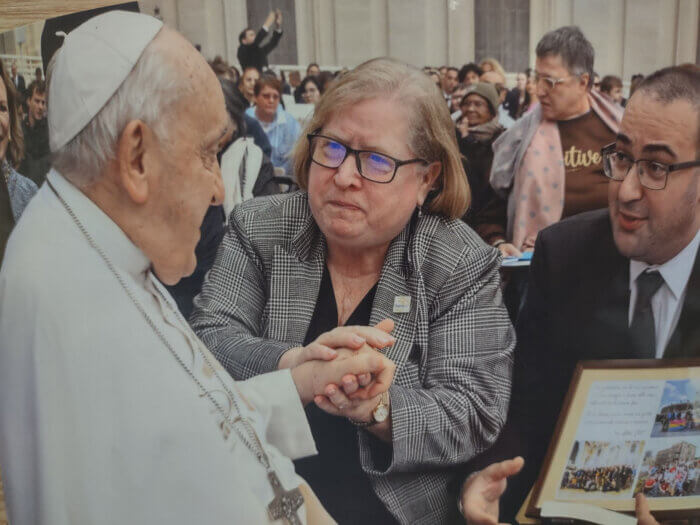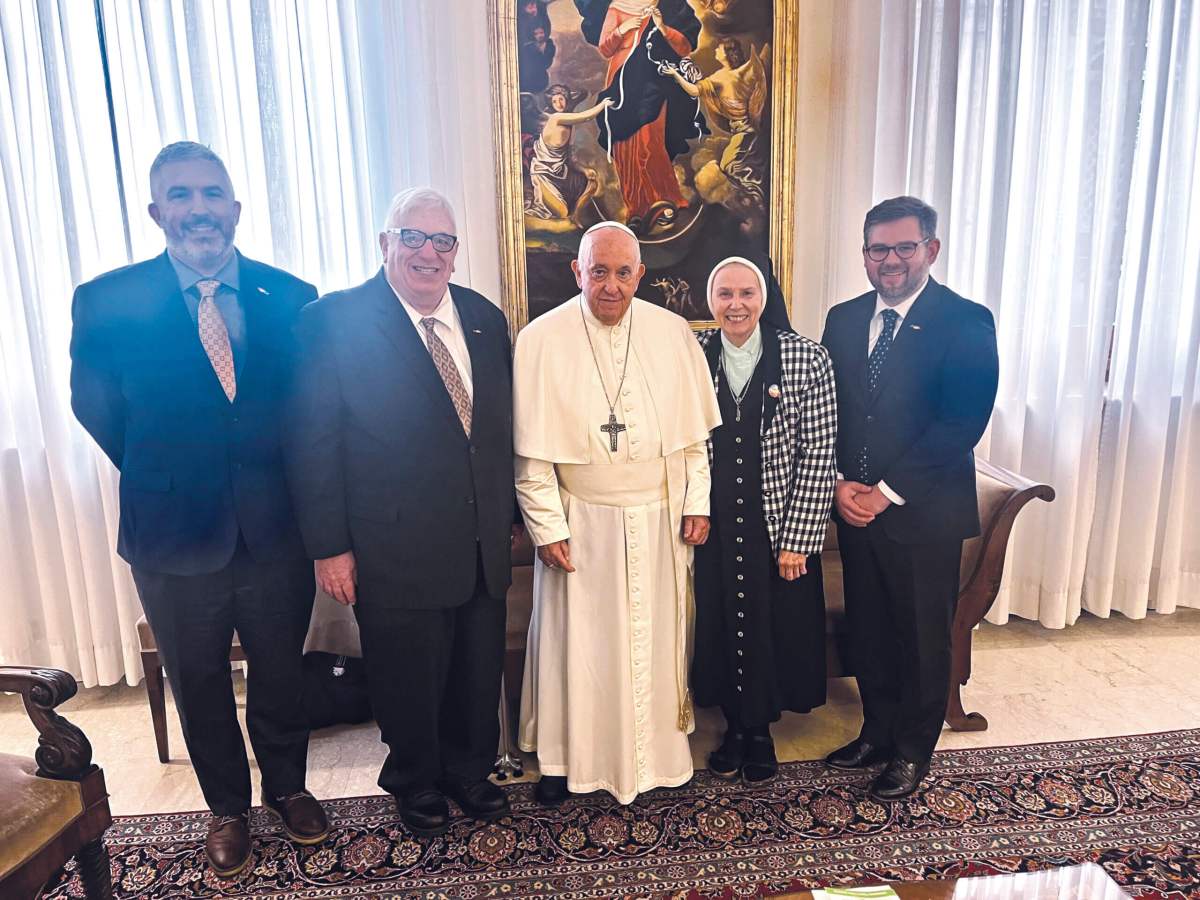Pope Francis opened his doors to the LGBTQ community in October when he met with the leaders of two Catholic LGBTQ advocacy groups, New Ways Ministry and Dignity USA, during a month-long gathering of church members known as a synod.
The meetings follow a letter published earlier in the month in which the pope indicated openness to blessing same-sex relationships, though he fell short of endorsing same-sex marriage. LGBTQ Catholic advocates told Gay City News they were encouraged by the conversations they held with the pope, and hope they will lead to further dialogue — but not necessarily an immediate change to Church doctrine.
“We have finally gotten the beginning of the dialogue that LGBTQ+ Catholics have been asking from church leaders for decades now,” said Francis DeBernardo, executive director of New Ways Ministry.
DeBernardo wasn’t sure what to expect when he entered what he described as an “open parlor” in the Vatican City on Oct. 17.
“I thought to myself, what do I do? Do I shake his hand? How do I call him?” he recalled thinking at the time. There wasn’t any pomp and circumstance when the pope walked in the room, he said. DeBernardo sat in a circle with other members of New Ways Ministry, including co-founder Sister Jeannine Gramick. “He just walked in, you know, it was like we were having afternoon tea, he welcomed us and started talking.”
DeBernardo said during their 50-minute conversation the pope reaffirmed his opposition to laws criminalizing LGBTQ people.
“He was very concerned about that,” he said. “He really wants LGBTQ people to be included in the church, but that’s because he wants everyone to be included in the church. It’s not like he has a gay agenda, it’s just that LGBTQ+ people are one piece of what he wants to see happen, which is to welcome everyone.”
DeBernardo added: “It was really very healing. To know that our work is now respected and affirmed by the highest level of the church, the pope. I think getting this affirmation from the pope is going to make people much less fearful about starting programs and initiatives [in the LGBTQ community].”

Catholic Church doctrine still officially considers “homosexual acts” to be sinful, and while there is not an official teaching on trans identity, it does equate a person’s birth anatomy with their gender, according to the Human Rights Campaign.
In response to a question posed by DeBernardo at a synod press briefing, Father Viral Tiramanna, who teaches moral theology at the National Seminary of Our Lady of Lanka, said LGBTQ equality is “a burning issue, in fact, all over the world today,” while adding “the church doesn’t have issues only to do with LGBTQ [people], for there are so many other groups.”
LGBTQ topics and questions about queer identity have been raised periodically throughout the synod process, which brings together Catholic leaders from across the world to discuss the church’s future. Synod delegates were set to release a report on Oct. 28, according to Marianne Dubby-Burke, the executive director of Dignity USA, an LGBTQ-affirming Catholic organization with chapters across the country, including in New York City.
The report, which would detail what was discussed at the synod, will be followed by a second gathering next October, at which time delegates will release a set of recommendations, potentially including modifications to church doctrine. After that, it’s up to Pope Francis to review the recommendations and write a response to them, usually six to eight months later, DeBernardo said.
A preliminary letter from synod leaders published on Oct. 25 emphasizes that “the Church absolutely needs to listen to everyone, starting with the poorest,” yet does not explicitly mention the LGBTQ community.
LGBTQ Catholics in New York City have also been following the synod and the pope’s statements closely. Despite being in an inclusive space with an LGBTQ ministry, it’s important for them that church doctrine changes for the better, said Jeff Stone, secretary and longtime member of Dignity New York, the local chapter of DignityUSA.
“It’s really a two-track model,” he said. “While we try to be the church that we think [we] should be, we also are very concerned that the acceptance and inclusion be widened. We recognize that not everyone has access to a community like ours.”
In Rome and Vatican City, Duddy-Burke has been busy meeting with synod delegates.
“They’re not necessarily folks that would walk into the room ready to support changes, but they’re asking questions and they’ve been listening really hard,” she said.
Particularly, she added, “I think our church has a lot to understand about the reality of transgender and non-binary people’s lives. There’s so much misinformation, sort of in the public square.”
Duddy-Burke, who is also co-chair of the Global Network of Rainbow Catholics, said from an international perspective it’s “essential” to bring the entire church on board with Pope Francis’ call “for homosexuality to be decriminalized worldwide.”
On Oct. 25, in St. Peter’s Square in the heart of the Vatican, Duddy-Burke and other members of the Global Network met with Pope Francis. “When 2023 started, meeting with the pope wasn’t on my bingo card,” she said from Rome.
“It was just a very human moment,” Duddy-Burke said. After thanking the pope for his stance on decriminalizing same-sex sexual activity, she gifted Pope Francis a shirt saying “Todos, Todos, Todos,” a phrase meaning “everyone, everyone, everyone,” that the pope stated during a speech in Lisbon, Portugal during world youth day in August, affirming the church is open to “everyone” including the LGBTQ community.
“After we had said the pieces about decriminalization and a more inclusive church, what he said was, ‘Andate Avanti,’” Duddy-Burke said. “Which means … keep moving forward, press on. That was his main message to us, which felt incredibly encouraging.”































